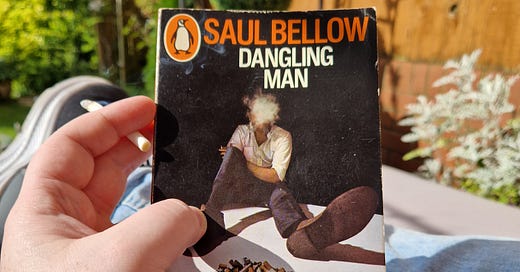A man stuck in a life between jobs and waiting to be conscripted during WWII is growing irritable. His thoughts and interactions appear in diary format, a method that complements the invasive observational style, particularly when the themes are focussed on mental health.
Do you have feelings? There are correct and incorrect ways of indicating them. Do you have an inner life? It is nobody's business but your own. Do you have emotions? Strangle them.
Saul Bellow is a fantastic writer, his descriptive style is accompanied by an intellectual mash-up of philosophy; historical contemplation, and social commentary. The resulting depth makes for an immersive, reflective reading experience, as though we are given an unpleasant but necessary insight into both an individual person's Human Struggle, and the struggle of those who lived during the Great Depression.
I am reminded of Dostoyevsky's 'Notes From Underground', Ivan Goncharov's 'Oblomov', and some of Charles Bukowski's work: a raw, honest display of turmoil; discomfort; melancholy and, often, anger. A stew of taboo human conditions that appear in many of my favourite novels.
The plot follows a series of interactions with an uncertain goal. We know that at some point our protagonist, Joseph, will be sent to war. But in the meantime we are left dangling with no clear structure. Bellow created an atmosphere of tragedy and dilemma through the social alienation of Joseph and the result is a solid reflection of what it must have been like for people waiting to be conscripted. The world carries on and expects you to carry on with it, but mentally and emotionally you have become detached.
Joseph spends much of his time idle, writing down musings and confessions. I enjoy reading characters like this: shabby and downtrodden, imperfect and unlikeable. I suppose it is because my own frustration for the world is allowed to exist within the confines of this type of fiction, without judgement or consequence. I am allowed to feel anxiety and melancholy if the protagonist is also feeling these things.
Joseph has been given the freedom to enjoy life until he gets the call to Arms, he is encouraged to do whatever he pleases, and yet this freedom becomes his prison, a suffocation that agitates his usual disposition and pushes away those around him.
...I am not at all sorry to part with the rest of it. I am no longer to be held accountable for myself. I am grateful for that. I am in other hands, relieved of self determination, freedom canceled. Hooray for regular hours! And, for the supervision of the spirit! Long live regimentation.
Dangling Man is an important observation on the human condition. It tells that our dreams, romances, desires and even our vices become meaningless in the face of uncertainty and instability. It is a condition that intrigues me greatly.
I am of the opinion that, in a broad sense, we are not meant to be happy creatures, and books like this act as an intellectual expression of what we, deep down, are fearful of. Existential dread manifest as fiction.
Have you read any Saul Bellow? Comment below!




